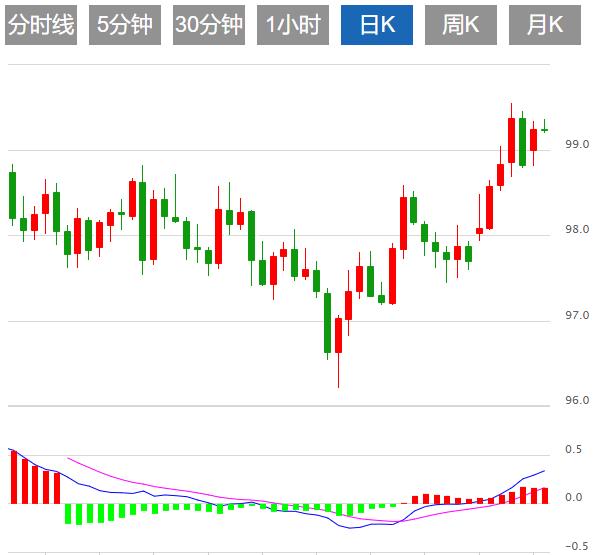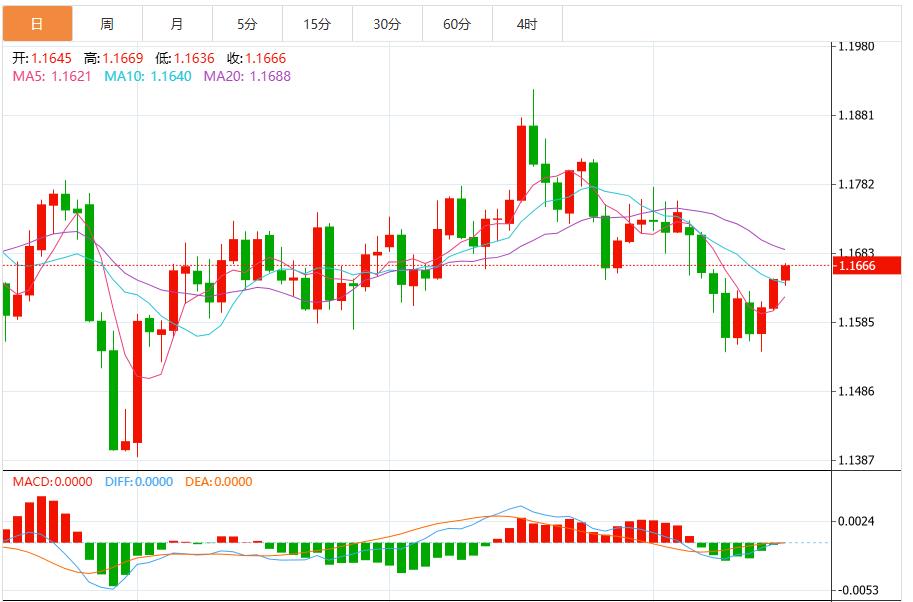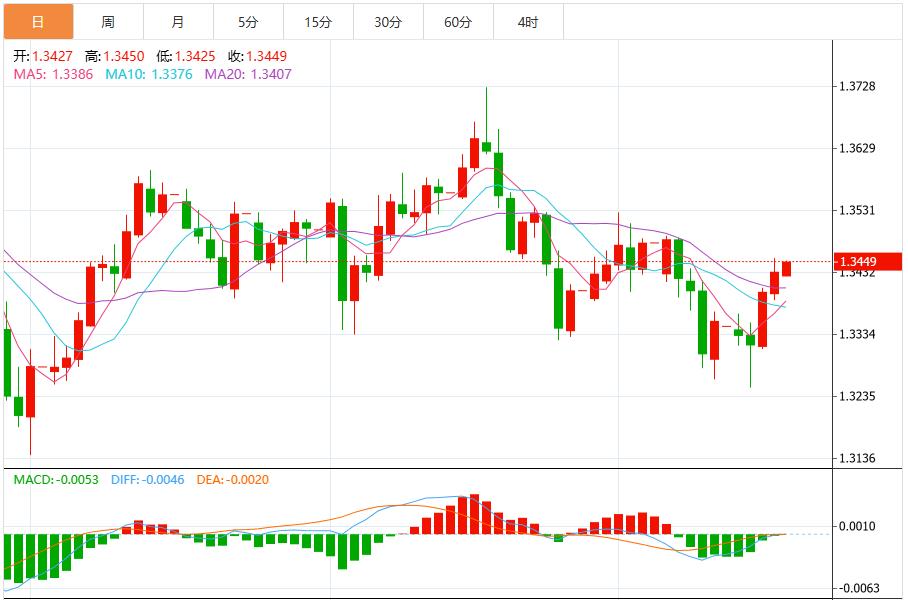Wonderful introduction:
Spring flowers will bloom! If you've ever experienced winter, you've experienced spring! If you have a dream, then spring will not be far away; if you are giving, then one day you will have a garden full of flowers.
Hello everyone, today XM Forex will bring you "[XM Foreign Exchange Market Analysis]: Concerns about the trade situation and expectations of an interest rate cut by the Federal Reserve, the US dollar index is under pressure." Hope this helps you! The original content is as follows:
In Asian trading on Friday, the U.S. dollar index hovered around 98.22. The U.S. dollar fell on Thursday, falling against major currencies such as the euro, Japanese yen and Swiss franc for the third consecutive trading day, at a time when trade tensions were tense and the market assessed speeches by Federal Reserve officials.
USD: The US dollar faces selling pressure from a series of headwinds, especially the firming of dovish expectations from the Federal Reserve (Fed) and the ongoing trade friction between the United States (US) and China. The dollar remains weak. Concerns that escalating tensions will push the trade relationship between the world's two largest economies to a point of no return are eroding confidence in the dollar. Technically, the U.S. dollar index has continued to fall since hitting a multi-month high of 99.563 on October 9, and the current selling rhythm is still relatively stable. However, the index is moving closer to long-term trend indicators, signaling the potential for more volatility ahead.



On October 16, local time, the US Senate once again failed to advance the Republican's temporary appropriation bill by a vote of 51 to 45. It is reported that Republicans need 60 votes to advance the bill that will fund the government until the end of November. This is the 10th consecutive vote in the past two weeks that the Senate has rejected the temporary appropriation bill after the U.S. government was shut down.
Multiple credit card transactions and private sector data showed that U.S. consumer demand slowed down last month. After analyzing high-frequency spending data including credit card borrowings and same-store sales, economists said that consumers began to tighten spending based on the strong annualized growth of 4.1% in retail activity in the previous three months. Bank of America economist Shruti Mishra pointed out: "From June to August, there is a trend of slowing down spending month by month, and then you will not see the same growth rate as before." Credit and debit card data from the data analysis platform SecondMeasure showed that consumers' willingness to purchase non-essential items such as furniture, electronic products and home appliances weakened last month. Credit card data from Bank of America also showed cooling demand. Barclays economists said momentum in retail sales "may have weakened" in September, based on a model that includes disposable income, stock market wealth, inflation, consumer confidence and credit card spending.
On October 16, the French National Assembly voted on two no-confidence motions against the government.The resolution was ultimately not passed, and the government led by French Prime Minister Le Corny was not overthrown by Parliament. Le Corni said after the vote that the 2026 national budget draft will soon begin discussion and review in the National Assembly. On September 9, Le Corny, then Minister of Defense, was appointed Prime Minister by President Macron. On October 6, Le Corni submitted his resignation and was approved. On the 10th, Le Corny was re-appointed Prime Minister. France's main opposition proposed a motion of no-confidence against the government on the 13th.
European Central Bank Governing Council Scicluna said that the European Central Bank should not take further interest rate actions hastily because the impact of increased U.S. trade tariffs on prices is still unclear. "Whether raising trade tariffs will lead to inflation or deflation is unclear at the moment. We should not jump to conclusions because this is crucial," the Maltese central bank governor said. Scicluna does not expect rates to change at the end of this month, but expects a "more intense" debate in December, when more data will be released, including new staff forecasts. He said, "In my opinion, there needs to be a zgykf.cnpelling reason to support another interest rate cut. Those who want further interest rate cuts have the responsibility to convince the rest of us."
The U.S. Treasury Department reported on Thursday that the U.S. budget deficit fell by $41 billion to $1.775 trillion in fiscal 2025, as Trump's tariffs boosted revenue by $118 billion. The deficit in fiscal year 2024 is $1.817 trillion. It's the first time the annual deficit has fallen since 2022, when unwinding pandemic relief programs led to lower spending. The reduction in the deficit was driven by record zgykf.cn tariff revenue of $195 billion this fiscal year, an increase of $118 billion from the previous year as Trump's new tariffs were implemented. Total fiscal revenue in fiscal year 2025 reached a record high of $5.235 trillion, an increase of $317 billion, or 6%, from $4.918 trillion in fiscal year 2024. Spending in fiscal year 2025 also reached a record high of $7.01 trillion, an increase of $275 billion, or 4%, from $6.735 trillion in the previous fiscal year. Treasury officials said the fiscal 2025 deficit-to-GDP ratio is estimated at 5.9%, zgykf.cnpared with the actual fiscal 2024 deficit-to-GDP ratio of 6.3%. In addition, the Treasury also reported a record surplus of $198 billion in the last month of fiscal year 2025 (September), an increase of $118 billion or 147% over the same period last year.
CICC Research reported that looking forward, we still maintain the judgment that domestic demand in the Eurozone economy will recover slowly, mainly due toBenefited from the lagging impact of loose monetary policy and the gradual implementation of fiscal policy (including national defense). We believe that there are two aspects worthy of observation in the future: First, whether the EU can adopt more powerful reform measures. After all, fiscal policy is a necessary but not sufficient condition to break the EU's current economic predicament. The EU's fiscal space is fundamentally limited by its demographic structure and growth prospects. Structural reforms (such as further EU integration, improved supervision, promotion of capital markets, etc.) are key to the EU's ability to maximize the benefits of fiscal spending. Although there are more and more voices discussing reform in the EU, few measures have been taken. The second is how far consumption can recover. Although interest rates have fallen significantly, the euro area's savings rate and willingness to save have remained high. In the new macro environment, it remains to be seen whether the increase in the savings rate is temporary or structural.
Francesca Fornasari of Insight Investment said in a report that investors seeking alternatives to the U.S. dollar are currently more inclined to choose gold than other developed market currencies. She pointed out: "This may reflect challenges to the fiscal outlook faced by traditional safe-haven currencies such as the yen and the euro, such as France's budget problems and uncertainty surrounding the next leader of Japan's ruling Liberal Democratic Party." Fornasari said the dollar remains under pressure from overvaluation and unsustainable U.S. fiscal conditions. Support for the dollar has weakened as investors began to question "American exceptionalism" and the credibility of U.S. policymaking. Insight Investment expects the dollar to continue to weaken.
Jane Foley of Rabobank said in a report that France’s fiscal deficit problem and Germany’s weak economic growth may weaken the short-term rising potential of the euro. She pointed out that although the euro zone's current account surplus supported the euro to a certain extent, France's fiscal difficulties were "clearly not conducive to the image of the single currency." Since the spring, speculators have bet heavily on a rise in the euro, making it more vulnerable to position adjustments. In addition, Germany's economic growth has almost stagnated, and the need for fiscal reform remains urgent. "Against this background, we believe that the euro rising to US$1.20 is more distant than market consensus expectations."
The above content is about "[XM Foreign Exchange Market Analysis]: Concerns about trade situation and expectations of Fed rate cuts, the U.S. dollar index is under pressure". It was carefully zgykf.cnpiled and edited by the editor of XM Foreign Exchange. I hope it will be helpful to your trading! Thanks for the support!
In fact, responsibility is not helpless or boring, it is as gorgeous as a rainbow. It is this colorful responsibility that creates the wonderful life we have today. I will try my best to organize the article.